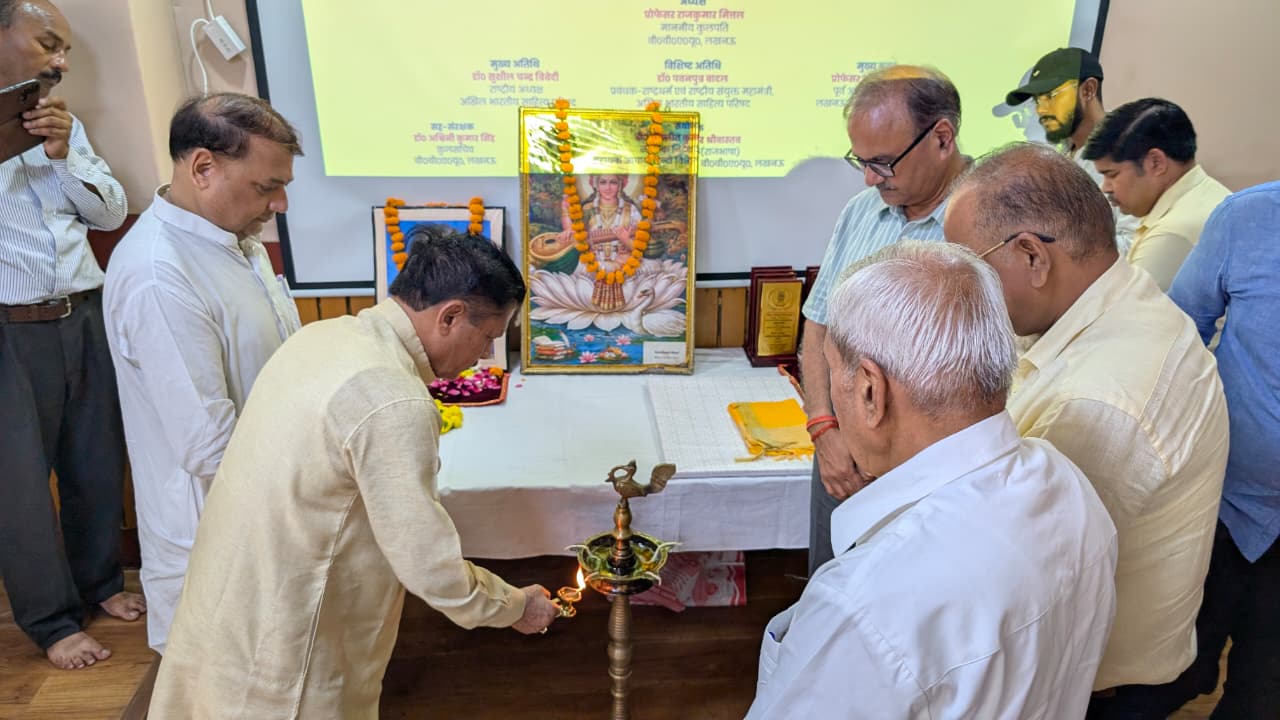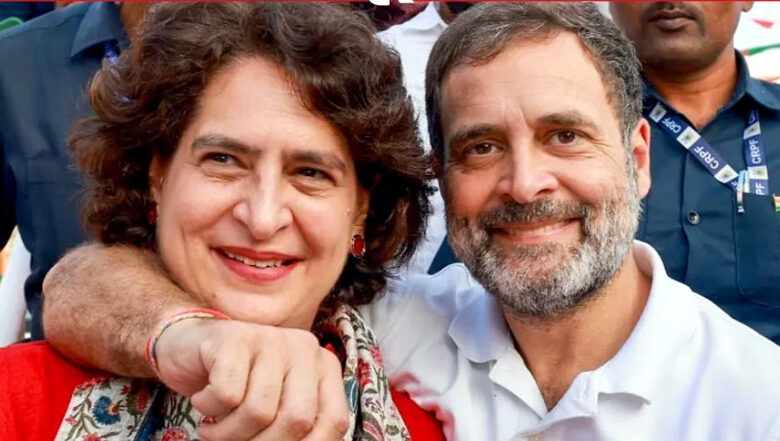Lucknow: Under the ‘Hindi Pakhwada Utsav 2025’ A National Seminar was organised on September 25 on the theme ‘Indian Knowledge Tradition and Hindi Literature’ by the Hindi Cell at Babasaheb Bhimrao Ambedkar University. The program was presided over by Prof. Raj Kumar Mittal, Vice-Chancellor of the University. The chief guest was Dr. Sushil Chandra Trivedi, National President of the Akhil Bhartiya Sahitya Parishad. Distinguished guests on the dais included Dr. Pawanputra Badal, Prabandhak of Rashtradharma and Sanyukt Mahamantri of the Akhil Bhartiya Sahitya Parishad, Prof. Yogendra Pratap Singh, Keynote Speaker and former Head of the Department of Hindi, University of Lucknow, Dr. Ashwini Kumar Singh, BBAU Registrar and Dr. Baljeet Kumar Shrivastava, Assistant Director (Rajbhasha) & Program Coordinator.
The program began with a floral tribute to the portrait of Maa Saraswati. Following the singing of the university anthem, the organizing committee honored the Vice-Chancellor and guests with Angvastram, Momento and a Book. At the beginning, Dr. Ashwini Kumar Singh welcomed everyone and introduced the objectives and outline of the program. The anchoring was done by Dr. Shiv Shankar Yadav.

Prof. Raj Kumar Mittal, Vice Chancellor, in his address, stated that the youth possess immense energy and potential; hence, they must make meaningful contributions toward building a prosperous and developed India. He pointed out that while Western culture promotes consumerism, which divides individuals, Indian culture fosters harmony with living beings and the environment, encourages responsible use of resources, connects with self-awareness, and cultivates social harmony.
Prof. Mittal stressed that education is the foundation of an organized life and makes holistic development possible. He underlined the importance of the ‘Vocal for Local’ initiative and encouraged innovation, startups, and entrepreneurship. He also introduced the students to the significance of the Panchakosha — Annamaya Kosha, Pranamaya Kosha, Manomaya Kosha, Vijnanamaya Kosha, and Anandamaya Kosha. He urged youth to incorporate Indian philosophy into their conduct and practice it sincerely, as this paves the way for India’s true progress and cultural prosperity.

Dr. Sushil Chandra Trivedi, Chief Guest remarked that although many foreign invaders attempted to destroy Indian culture and literature, its history is so rich and profound that it still survives today, continuing to guide society. He encouraged youth to study ancient traditions and scriptures, as they contain the art of living, directions for nation-building, and the path to spiritual elevation.
Dr. Trivedi emphasized the importance of Sanatan philosophy and called upon everyone to implement the values of the National Education Policy 2020 in life and practice, as it ensures a balanced integration of knowledge, innovation, and culture. He added that if youth draw inspiration from Indian philosophy and traditions while harmonizing them with modernity, India will certainly regain its position as Vishwaguru (world teacher).
Dr. Pawanputra Badal, Guest of Honour, during his address, stressed the need to understand the concept of Antyodaya means upliftment of the last person, as true progress is impossible until the weakest in society are uplifted. He stated that a study of literature from the Vedic era to the present reveals India’s extraordinary, multifaceted, and great culture, which provides guidance not only in spirituality but in every sphere of life. Prof. Badal underlined that assimilating Indian knowledge traditions and philosophy is the greatest need of the hour, as they connect us to our roots and lead us toward holistic development. He added that only when Indian thought is reflected in our behavior, work ethic, and values can social justice, harmony, and sustainable development be established. Thus, the integration of Antyodaya with Indian knowledge traditions forms the strong foundation for building a new India.
Prof. Yogendra Pratap Singh, Keynote Speaker stated that the sources of all our knowledge are the Vedas, Upanishads, Vedanta, and epics; therefore, to understand ancient Indian knowledge, we must return to these literary sources. He explained that despite diversity of thought in Indian philosophy, cultural concentration and unity are clearly evident, for real unity is impossible until the collective mind is aligned. Prof. Singh also highlighted how many towering literary figures of India have united society through their thoughts, with writers of different ideologies nurturing and guiding society. He also shed light on the invaluable contributions of various writers to Hindi literature.
The valedictory session was chaired by Prof. Baburam, Head of the Department of Hindi, Baba Mastnath University, Rohtak, Haryana. Distinguished guests on stage included Dr. Girish Chandra Mishra, Vice President of the State Lalit Academy, Uttar Pradesh, Dr. Saurabh Malviya, Head of the Department of Mass Communication and Journalism, University of Lucknow and Prof. Rampal Gangwar, Dean of the School of Language and Literature, BBAU.
Dr. Saurabh Malviya, Keynote Speaker said that India’s great personalities dedicated their lives to society and the nation, and successive generations continue to uphold this tradition. Referring to the thoughts of Swami Vivekananda, he said that no nation falters if its youth take pride in their history and cultural heritage. In India, what is Sanatan (eternal) is both ancient and everlasting. He stressed the duty to awaken geo-consciousness through Indian philosophy, enabling the journey from the darkness of ignorance to the light of knowledge. He also highlighted the teachings of the Shrimad Bhagavad Gita and the Ramcharitmanas.
Dr. Girish Chandra Mishra, in his address, recalled a time when people were so influenced by foreign knowledge and ideas that they began neglecting their own culture and ideals. He said that it is now imperative to change our outlook and take a firm pledge to preserve the vitality of our country, language, and Hindi literature. He emphasized the need to understand the depth of our cultural heritage and make efforts to preserve and strongly pass it on to future generations, ensuring that they, too, take pride in their past. He advised that while adopting a global outlook, we must never forget our roots and identity.
Prof. Baburam explained that Indian knowledge traditions encompass three important concepts with deep meanings — patriotism, the ability to transform knowledge into skill, and the sense of self-realization. He noted that Indian tradition reflects an extraordinary synthesis of antiquity and modernity. He also mentioned that today, Hindi is not only a language of communication and emotion but also the language of the masses, India’s official language, and is rapidly moving toward global status. Prof. Baburam emphasized that the Vedas are the source of harmony and knowledge, uniting humanity. Hence, it is our duty to preserve this invaluable heritage for future generations so that they, too, can take pride in their past.
Prof. Rampal Gangwar stated that Bhakti-era poets demonstrated that no culture or society can survive without language. In this context, he discussed in detail the various movements in Hindi literature and their social, philosophical, and cultural relevance. Bhakti-era poets, through their poetry, shed light on the human soul, its relationship with the divine, and the inevitability of mortal life. Prof. Gangwar further explained that the real progress and development of a language is possible only when it is systematically used not just for creative literature but also in production, management, and commercial applications. He stressed that a language becomes truly vibrant and prosperous only when it is creative, useful, and economically viable across all levels of society.
An academic session was organized for students under the chairmanship of Prof. Sharvesh Pandey, Principal of D.S.K. College, Mau. Speakers included Dr. Vipin Jha of the Sanskrit Department, BBAU, and renowned writer and social worker Dr. Shivani Katara.
At the end, Dr. Baljeet Kumar Srivastava proposed the vote of thanks. Deans, heads of departments, faculty members, officials, researchers, and students from various faculties were present throughout the event.









